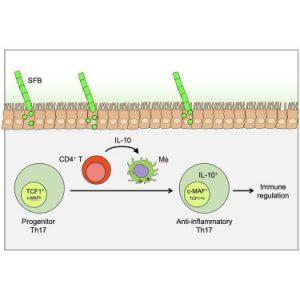In a recent study, researchers uncovered a significant role played by beneficial commensal microbes in the gut: they stimulate the host to produce T cells that contribute to gut health by mitigating inflammation (Figure 1).
Previously, researchers had noted the generation of specific T cells when commensal microbes took residence in the gut, functioning to regulate these microbes. Investigating further, the study, conducted in both tissue culture and mice, demonstrated that these commensal-induced T cells alleviate inflammation by producing the cytokine IL-10.
Ordinarily, tissues harbour two types of T cells—one that fosters inflammation to clear infections and another that suppresses inflammation, moderating the immune response post-infection. Notably, commensal-induced T cells exhibit characteristics of both types, likely since commensal microbes don’t require elimination, and the immune response to them has evolved to be less inflammatory.
Additionally, the study revealed that commensal T cells can suppress other types of T cells. This suggests they serve as a backup or additional system to prevent autoimmunity, a condition where excessive inflammation prompts the immune system to attack the body’s own cells.
Understanding the connection between friendly microbes, commensal T cells, and their anti-inflammatory functions offers potential avenues for developing innovative therapies to prevent intestinal inflammation associated with IBD. The replication of how these microbes induce anti-inflammatory T cells may pave the way for groundbreaking approaches in the treatment of IBD.
Journal article: Brockmann, L, et al. 2023. Intestinal microbiota-specific Th17 cells possess regulatory properties and suppress effector T cells via c-MAF and IL-10, Immunity.
Summary by Stefan Botha











